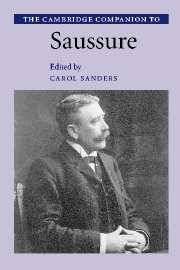Book contents
- Frontmatter
- Introduction: Saussure today
- Part I Out of the nineteenth century
- Part II The ‘Course in General Linguistics’
- Part III After the Cours
- 7 Saussure and American linguistics
- 8 Saussure and structuralist linguistics in Europe
- 9 The Russian critique of Saussure
- 10 Saussure, Barthes and structuralism
- 11 Saussure’s anagrams
- 12 Saussure and Derrida
- Part IV New debates and directions
- Notes
- Works by Saussure and further reading
- References
- Index
12 - Saussure and Derrida
from Part III - After the Cours
Published online by Cambridge University Press: 28 May 2006
- Frontmatter
- Introduction: Saussure today
- Part I Out of the nineteenth century
- Part II The ‘Course in General Linguistics’
- Part III After the Cours
- 7 Saussure and American linguistics
- 8 Saussure and structuralist linguistics in Europe
- 9 The Russian critique of Saussure
- 10 Saussure, Barthes and structuralism
- 11 Saussure’s anagrams
- 12 Saussure and Derrida
- Part IV New debates and directions
- Notes
- Works by Saussure and further reading
- References
- Index
Summary
Derrida's explicit discussion of Saussure is essentially to be found in the chapter 'Linguistics and grammatology' in his De la grammatologie (1967a), with some of his findings summarised in the collection of interviews entitled Positions (1972a), and in the essay 'Le cercle linguistique de Genève' (an extended abstract of the whole of De la grammatologie) reprinted in the volume Marges - de la philosophie (1972b). A further discussion of Saussure, concentrating on the latter's remarks about onomatopoeia, is to be found in Glas (1974), and scattered remarks can be found in many other books and essays. Although this amounts to a relatively small portion of Derrida's vast published output, it would not be an exaggeration to say that the reading of Saussure (we shall here be following almost exclusively the chapter from De la grammatologie) allows for one of Derrida's most perspicuous presentations of his 'early' thinking, and one of the clearest derivations of such famous 'concepts' as différance, trace and archi-écriture. In characteristic 'deconstructive' fashion, Derrida appears at first to be concentrating on a secondary or marginal aspect of Saussure's theory (the discussion of writing in chapter 6 of part I of the Cours), but then draws from that discussion startlingly broad and general claims about Saussure's theory as a whole, and about language, linguistics and indeed philosophy and thinking more generally. It should be pointed out from the start that Derrida's reading of Saussure is not that of a professional linguist, nor that of a Saussure scholar: he is at pains to point out in the introduction to his chapter that Saussure figures in his essay as a 'privileged example', the particularity of which should not affect the generality of the issues raised (Derrida, 1967a: 44), or, a little later, as 'a very conspicuous index in a given situation' (Derrida, 1967a: 67) and aims to raise questions which go well beyond the confines of Saussure's explicit concerns. As we shall see, those questions are not even quite philosophical, insofar as part of what Derrida is seeking in Saussure is a way of thinking which goes beyond the grasp of philosophy as traditionally defined.
- Type
- Chapter
- Information
- The Cambridge Companion to Saussure , pp. 186 - 202Publisher: Cambridge University PressPrint publication year: 2004
- 3
- Cited by



